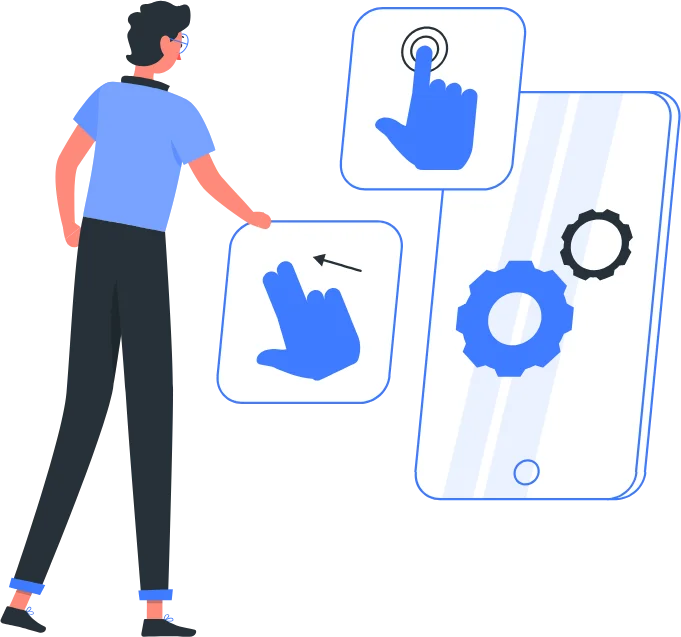What is a "Hybrid App"?
Hybrid App Features & Benefits

- Hybrid Apps are developed 2.5 times faster than native apps, reducing time-to-market and development costs.
- Hybrid Apps provide up to 75% cost savings compared to native app development.
- As of 2023, more than 90% of mobile apps are built on hybrid app development platforms.
Hybrid App Development Process

Our Domain Expertise in Hybrid App Development

Hybrid App Development Stack
- Frontend – HTML, CSS, and JavaScript
- JavaScript Frameworks – React, Angular, and Vue
- Development Frameworks – Ionic, PhoneGap, and React Native
- Backend – Node.js, Firebase, AWS
- Databases – MongoDB, MySQL
- Cloud services – AWS, Microsoft Azure, GCP
Hybrid App Enhancement
- UI & UX Design & Improvements
- Code Refactoring
- Performance Optimization
- New Feature Development
- Integration with Third-party Services and APIs
Hybrid App Support & Maintenance
- Security updates and vulnerability testing
- Bug fixing and troubleshooting
- Server and database maintenance
- Compatibility testing with new operating systems and devices
- Backup and disaster recovery planning
- User support and helpdesk services
- Third-party API and plugin updates
Hybrid App UI & UX Design
- User Research
- Wireframing & Prototyping
- Asset Creation
- Intuitive Layout & Navigation
- User flow
- Responsive Design
Hybrid App Testing
- Functional testing
- Performance testing
- Compatibility testing
- Security testing
- Usability testing
Hybrid App Development FAQs
What are the emerging trends in Hybrid App Development?
Increased adoption of cross-platform frameworks: Cross-platform frameworks such as React Native, Ionic, and Xamarin are becoming increasingly popular among hybrid app developers. These frameworks allow developers to write a single codebase that can be used to create apps that can run on multiple platforms.
Integration of AI and Machine Learning: The integration of AI and machine learning technologies are expected to revolutionize hybrid app development in the future. These technologies can be used to create intelligent apps that can learn and adapt to user behavior, providing personalized experiences and recommendations.
Progressive Web Apps (PWAs): These web-based applications are installed on a user's device and offer an app-like experience. They are fast, reliable, and can work offline, making them popular among hybrid app developers. PWAs are expected to gain popularity as they offer a consistent user experience across devices and platforms.
Cloud-based development: These tools are becoming increasingly popular among hybrid app developers. These tools allow developers to build and deploy apps using cloud infrastructure, which can help reduce development time and costs.
Integration with IoT: Integrating hybrid apps with IoT devices is expected to become more common in the future. Hybrid apps can control and monitor IoT devices, providing users with an integrated experience.
Blockchain integration: The integration of blockchain technology is expected to revolutionize hybrid app development by enabling secure and transparent transactions, data sharing, and authentication. Hybrid apps can create blockchain-based applications for finance, healthcare, and supply chain management industries.
What are the types of Hybrid Apps?
There are three main types of hybrid apps:
Web-based hybrid apps: These are mobile-optimized websites packaged as a mobile app using a hybrid app development framework. They are built using HTML, CSS, and JavaScript and can be deployed across multiple platforms.
Native wrapper hybrid apps: These apps use a native shell that wraps around a web-based app to provide access to native device features such as camera, GPS, and contacts. The majority of the app is built using web technologies, and the native wrapper is used to provide access to device features.
Cross-compiled hybrid apps: These apps are built using a cross-compiler that compiles a single codebase into native code for multiple platforms. This allows developers to write the app once and deploy it across multiple platforms while still providing access to native device features.
Which language type is used for hybrid apps?
Hybrid app development can be done using a variety of programming languages depending on the hybrid app development framework being used. Popular hybrid apps frameworks like React Native and Ionic use JavaScript, while Xamarin uses C#, and PhoneGap uses HTML, CSS, and JavaScript.
What are the benefits of Hybrid Apps compared to Native apps?
Hybrid apps have several advantages compared to native apps, such as lower development costs and time, cross-platform compatibility, access to native device features, and easy maintenance and updates. Hybrid apps offer a seamless user experience and faster deployment than native apps.
What are the benefits of Hybrid Apps compared to Cross-Platform Apps?
Hybrid and cross-platform apps are options for developing apps that can run on multiple platforms. However, hybrid apps have a more native look and feel, better performance, and access to native device features.
